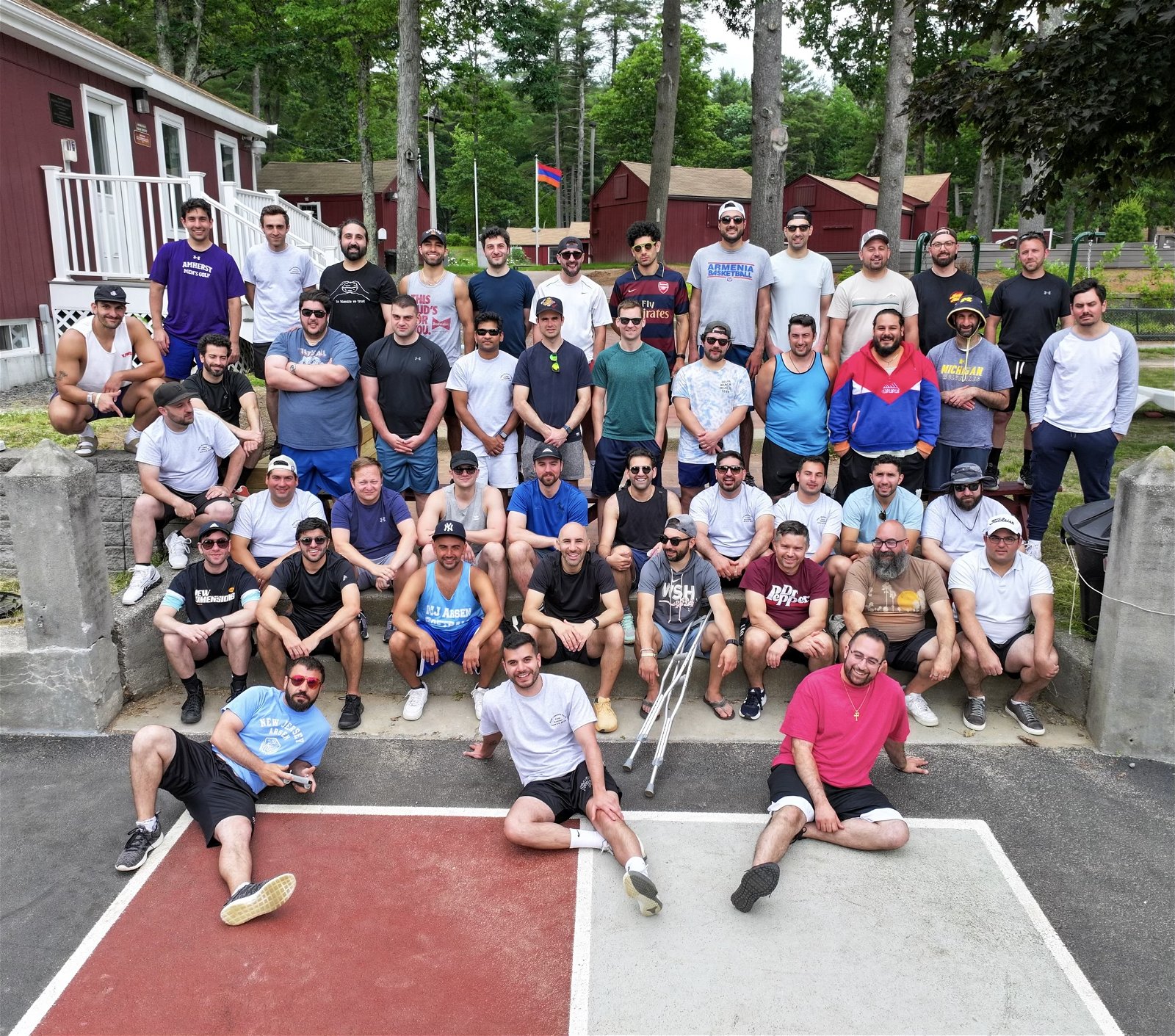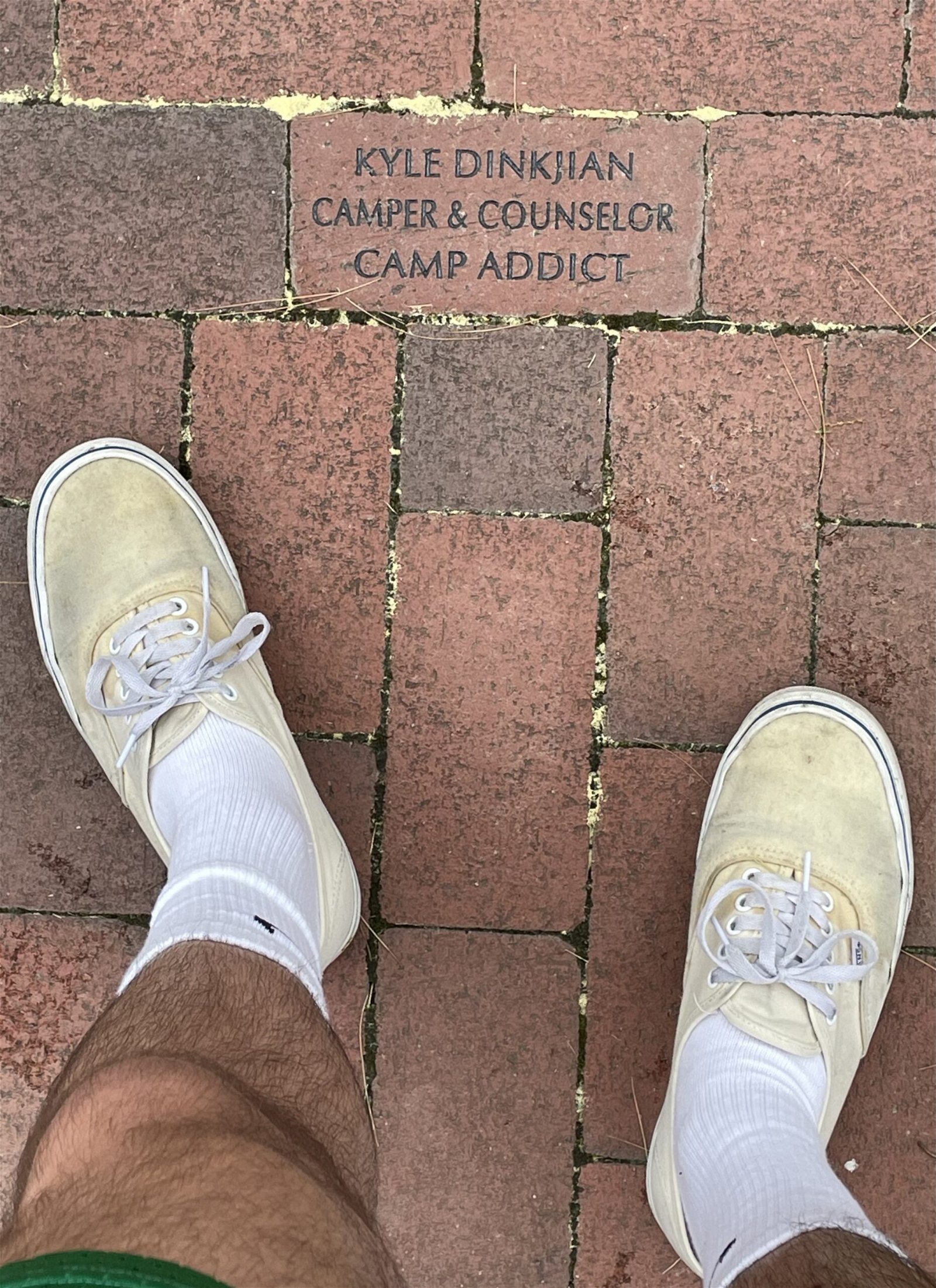 Camp picture at the front steps
Camp picture at the front steps
“You can’t go home again.” The expression gained popularity as the title of Thomas Wolfe’s 1940 novel, which tells the story of an author and his newly-published book that makes several references to his hometown. When the book gains national popularity, the backlash from the hometown residents is immediate, as they feel exposed by the out-of-touch author. In response, the residents ostracize him, driving him from his hometown instead of welcoming his success, until the author eventually returns at the very end of the novel. Throughout the book, the theme is clear and right there in the title: you can’t go home again. The places from your past change, and they’re never as you remember them. Or worse — maybe they don’t change, and instead you do.
My first summer as a camper at Camp Haiastan was in 1999 and my last on staff was in 2012. For 14 glorious summers, Camp Haiastan was my home. I longed for summer throughout the school year, and once the camp season finally started I would remind myself daily to appreciate how special my time there was. When it would end, the palpable post-camp depression would set in. Camp stories and memories were all I’d want to talk about; ask any of my odar friends from Fort Lee or Bentley University. I lived through 14 years of this cycle — waiting for camp, not wanting it to end, not being okay when it did. Then one year, camp was over for good, and I’d never spend a summer there again — that is, until a weekend earlier this month, for my bachelor party.
My friends and I had batted around the idea of a camp reunion, but we never had the time or the reason to actually plan one. For a long time, it was just a fun little idea to dream about — one last summer at camp, another chance to just be campers. But with my nuptials scheduled for this fall, the idea finally had a purpose, and one additional Camp Haiastan session was planned.
 One of Kyle Dinkjian’s bricks in the Cabin Circle
One of Kyle Dinkjian’s bricks in the Cabin Circle
Anticipation leading up to the weekend was high. Texts and conversations with friends who would attend all had a similar air of “I can’t believe this is happening.” This time it would be my dream session, including all my friends, Armenian and odar. RSVPs arrived, t-shirt sizes were accounted for, packing lists were sent and finally, it was time to go. The morning I left for camp I woke up in my New York City apartment with the same thought I had for years around this time: “My next sleep is going to be at camp.” The ride to Franklin may have felt shorter than when we were kids, and the I-495 exit number for King Street may have changed, but the energy of turning right onto Summer Street and then left into Camp Haiastan after the long wooden fence was exactly the same.
The familiarity seemed to stop there though.
From the moment I stepped onto the campgrounds, the day before the rest of my bachelor party guests arrived, it was clear that so much had changed since my last summer there. The differences jumped out at me. Right away, I noticed the basketball courts were now painted a bright, light grayish-blue color, rather than the no-frills uneven blacktop from my years growing up. Under the Trees had fewer, well, trees than in my youth. And the benches weren’t the ones I recognized, the ones my late godfather Mark Alashaian would call me over to on visiting Sundays for an ear pull and some gossip. The flower bed and the grass in the Cabin Circle looked refreshed, and a walk towards the back buildings made me feel like I was on another planet. The washstands are now a camper bunk and the showers, a staff lounge. The old bathrooms were turned into an arts and crafts room, and the new bathrooms include showers and sinks but no washstands. Maybe most jarring of all, the new bathrooms have actual mirrors above the sinks, different of course from the warped pan-like surfaces we’d struggle to brush our teeth in and catch fleeting glimpses of ourselves.
Then the sun went down, and the changes became even more evident. There was always something about camp at night. It used to be dark and, I’m not too proud to admit, scary. I’m talking dark enough to make me think twice about leaving the cabin for the bathroom, even as a staff member. This time, camp was inundated with lights. There were flood lights on the basketball courts, in the Cabin Circle, around the back buildings and shining brightly on the new bathrooms. Sneaking out must be 10 times more difficult today than it was in the past, and it must be way less scary for the campers to go to the bathroom at night. But I guess that’s part of the point, right? Change for the better.
But was it really better? Had I made a mistake by coming back? Was trying to return to the camp I loved as a kid a fool’s errand? I knew we could never go back to the time we were campers, but was coming back to the place too much to ask for, too? As my guests started arriving, after the hugs and laughs and thanks-for-comings, I gave a warning to those who’d been to camp before. “It’s different.” We’d have to lean on camp traditions to prove otherwise.
That first night, we ate barbecue, just like we did when we were campers. Although the pulled pork, burnt ends, chicken wings and all the fixings were more unctuous than the hot dogs, hamburgers, soggy salad and steamed corn on the cob of my youth, we made sure to dine with a view of Uncas Pond like old times. To my delight and relief, it didn’t take long for the old camp memories, the stories and the laughs to start flowing.
We followed dinner with a Night Activity, the old camp classic and necessary evil, Introduction Night. It’s no one’s favorite Night Activity, but that’s not the point. It’s an announcement of your presence, right now, to camp. It’s a sign that you’re not just visiting or passing through. You’re here to stay at camp, and everyone else staying there should know who you are. When you introduce yourself to Camp Haiastan, you become a part of it, and it becomes a part of you. We said our names, our ages, where we’re from, how long we’ve been coming to camp and answered a mystery question. As if on cue, the old nicknames, “yeah, first year!” shouts and laughs from witty answers came back like a boomerang. Reverberating.
The following morning felt a little more familiar. It started with the sounds — birds and bugs chirping, cabin doors swinging open and slamming shut (you know the sound) and the shuffling of feet towards the bathrooms, as we shook off the morning grogginess after sleeping on a bunk bed. Soon after, the sounds of basketballs hitting the backboards, the wooden and metal swings rocking, kickballs and tennis balls being smacked around. Laughter.We ate meals in the Mess Hall, chilled at the swings and blared music over the PA. We played knockout and foursquare, soaked in the view of Uncas and its dock, and swapped camp stories Under the Trees in the shadow of Mark’s dedication plaque. We took a trip to go bowling at the newly-developed Patriot Place, and although it wasn’t Ficco’s Bowladrome in Franklin like we remember from our time at camp, this place got the job done, too.
On the last day, we split into teams and competed in a camp Olympic-style Ironman competition. We danced the Michigan hop in the Cabin Circle, folded the American flag like a boreg on the Rec Hall deck, buddy walked across the A-Field, played the alphabet game and brain teaser and, for the win, played a thrilling half-court shootout.
Days flew by like seconds — that’s something that never changes about camp — and as the last day came to a close, we gathered in the Cabin Circle to ceremoniously lower the Armenian and American flags, singing Mer Hairenik and My Country, ‘Tis of Thee. Like a light switch flicking off, the jovial attitude of the weekend turned solemn and serious. Part of us feared that a counselor might take away free time or Camp Store privileges if we disrespected the flags. The other part of us knew this dream was coming to an end. Come the next day, we wouldn’t be kids at camp anymore.
Pick-up Sunday, of course, came anyway, and we packed our things and rolled up our sleeping bags. New friends exchanged contact information and helped each other load their cars. We cleaned the campgrounds and asked Facilities Manager John Miller to do a final cabin inspection. We said goodbye to our beloved Camp Haiastan, and the post-camp depression set in like it always does.
Maybe camp thought I’d outgrown it or that I wouldn’t be able to love it the way I always had. We proved each other wrong, though. We fit a session’s worth of camp memories into a single weekend. We reminded each other that though we grow and change, we can still keep the Camp Haiastan traditions alive and find ways to make it better than it was.
On the car ride home I thought about the weekend, replaying my favorite memories and the best laughs of the session, just like I did on rides home as a kid. I thought about camp and its many changes, how I barely recognized it at first, how I worried my time there wouldn’t be the same. But I had changed, too. Maybe camp looked at me and had all the same fears. Maybe camp thought I’d outgrown it or that I wouldn’t be able to love it the way I always had. We proved each other wrong, though. We fit a session’s worth of camp memories into a single weekend. We reminded each other that though we grow and change, we can still keep the Camp Haiastan traditions alive and find ways to make it better than it was.
What does Thomas Wolfe know about going home anyway? I pulled out my phone and connected to the car’s sound system. I scrolled through Spotify and queued up a song as we pulled out of the Camp Haiastan gates: Bon Jovi’s “Who Says You Can’t Go Home?” That sounds about right.
Special thanks to my friends Raffi Sarajian and Raffi Massoyan for all their help planning and executing this amazing weekend. Thank you to everyone who took time out of their schedules to attend. Special shout out to all my Bentley friends who attended and now have some context around my lifelong obsession with camp (yeah, first year!). Thanks to the camp board, executive director and unger John Miller for allowing us to return to camp and for all the assistance along the way. Thanks to my sister Arev for helping me write this. And thanks to Camp Haiastan, for everything.
Author information

Kyle Dinkjian
Kyle Garo Dinkjian was raised in an Armenian household in Fort Lee, New Jersey. He attended Bentley University and graduated with a degree in Economics. He is a New Jersey Arsen AYF alumnus and currently lives and works in Manhattan.
The post Going Home appeared first on The Armenian Weekly.
